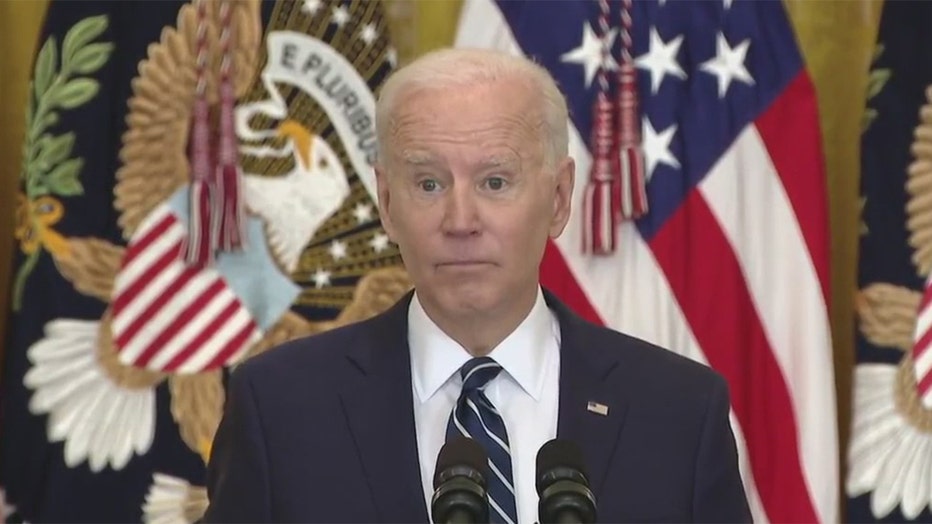President Biden holds 1st news conference
Biden on 2024
President Joe Biden says he expects to run for reelection with Vice President Kamala Harris in 2024.
WASHINGTON - President Joe Biden said that he plans to run for reelection in 2024 when asked at his first news conference since becoming president.
When a reporter pressed for a concrete yes or no answer, Biden said, "My plan is to run for re-election. That is my expectation."
He said Harris would remain on the ticket should he run again. When asked if he expects to run against Donald Trump, Biden smiled and laughed.
Biden held off on holding his first news conference so he could use it to celebrate the passage of a defining legislative achievement, his giant COVID-19 relief package. But he's being pressed at Thursday's question-and-answer session about all sorts of other challenges that have cropped up along the way.
A pair of mass shootings, rising international tensions, early signs of intraparty divisions and increasing numbers of migrants crossing the southern border are all confronting a West Wing known for its message discipline. Biden is the first chief executive in four decades to reach this point in his term without holding a formal news conference. He was meeting with reporters for the nationally televised afternoon event in the East Room of the White House.
The scene looks very different from what Americans are used to seeing for formal presidential news conferences.
The president is still standing behind a podium against a backdrop of flags. But due to the pandemic, only 30 socially distanced chairs for journalists were spread out in the expansive room. The White House limited attendance due to the virus, and aides were to sanitize microphones before they are shuttled to the reporters called upon by Biden.
Biden takes questions
Joe Biden appeared before reporters for his first press conference as president of the United States.
While Biden has been on pace with his predecessors in taking questions from the press in other formats, he tends to field just one or two informal inquiries at a time, usually in a hurried setting at the end of an event or in front of a whirring helicopter.
Pressure had mounted on Biden to hold a formal session, which allows reporters to have an extended back-and-forth with the president on the issues of the day. Biden's conservative critics have pointed to the delay to suggest that Biden was being shielded by his staff.
West Wing aides have dismissed the questions about a news conference as a Washington obsession, pointing to Biden’s high approval ratings while suggesting that the general public is not concerned about the event. The president himself, when asked Wednesday if he were ready for the press conference, joked, "What press conference?"

Behind the scenes, though, aides have taken the event seriously enough to hold a mock session with the president earlier this week. And there is some concern that Biden, a self-proclaimed "gaffe machine," could go off message and generate a series of unflattering news cycles.
His appearance comes just a day after he appointed Vice President Kamala Harris to lead the government’s response to the situation at the U.S.-Mexico border, where the administration faces a growing humanitarian and political challenge that threatens to overshadow Biden's legislative agenda.
In less than a week, two mass shootings have rattled the nation and pressure has mounted on the White House to back tougher gun measures. The White House has struggled to blunt a nationwide effort by Republican legislatures to tighten election laws. A pair of Democratic senators briefly threatened to hold up the confirmation of Biden appointees due to a lack of Asian American representation in the Cabinet. And both North Korea and Russia have unleashed provocative actions to test a new commander in chief.
In a sharp contrast with the previous administration, the Biden White House has exerted extreme message discipline, empowering staff to speak but doing so with caution. The new White House team has carefully managed the president’s appearances, which serves Biden’s purposes but denies the media opportunities to directly press him on major policy issues and to engage in the kind of back-and-forth that can draw out information and thoughts that go beyond curated talking points.
Having overcome a childhood stutter and famously long-winded, Biden has long enjoyed interplay with reporters and has defied aides’ requests to ignore questions from the press. He has been prone to gaffes throughout his long political career and, as president, has occasionally struggled with off-the-cuff remarks.
Those are the types of distractions his aides have tried to avoid, and, in a pandemic silver lining, were largely able to dodge during the campaign because the virus kept Biden home for months and limited the potential for public mistakes.
With the Associated Press

